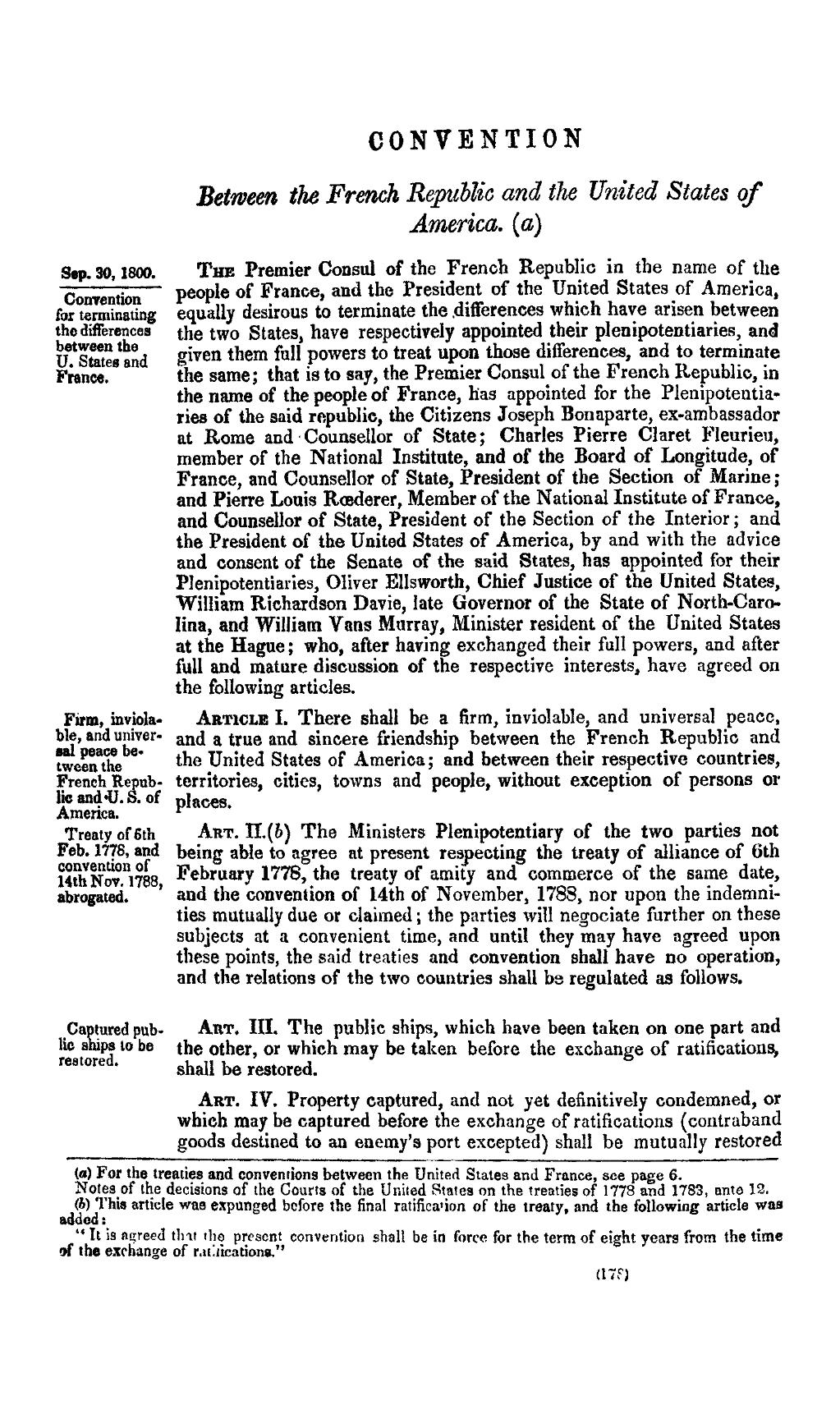C O N V E N T I O N Between the French Rqoubltc and the United States of America. (a) S•p.30, 1800. Tm-: Premier Consul of the·French Republic in the name of the
people of France, andthe President of the United States of America,
for terminating equally desirous to terminate the differences which have arisen between
- h° ¢m`°*°¤°¤¤ the two States, have respectively appointed their plenipotentiaries, and
i’f"§f,;';su;:d given them full powers to treat upon those differences, and to terminate France. the same; that is to say, the Premier Consul of the French Republic, in the name of the people of France, has appointed for the Plenipotentiaries of the said republic, the Citizens Joseph Bonaparte, ex·ambassador at Rome and·Counsellor of State; Charles Pierre Claret Fleurieu, member of the National Institute, and of the Board of Longitude, of France, and Counsellor of State, President of the Section of Marine; and Pierre Louis Rtnderer, Member of the National Institute of France, and Counsellor of State, President of the Section of the Interior; and the President of the United States of America, by and with the advice and consent of the Senate of the said States, has appointed for their Plenipotentiaries, Oliver Ellsworth, Chief Justice of the United States, William Richardson Davie, late Governor of the State of North-Carolina, and William Vans Murray, Minister resident of the United States at the Hague; who, after having exchanged their full powers, and after fplll fund mature discussion of the respective interests, have agreed on t e ollowing articles. Firm, inviola- ARTICLE I. There shall be a firm, inviolable, and universal peace, m»°;;“£;V°" and a true and sincere friendship between the French Republic and ,wcg:,h,, ° the United States of America; and between their respective countries, grenepglgnbi territories, cities, towns and people, without exception of persons or '°¤¤.' · ·° laces America. P ` Treaty ofsth Am-. II.(b) The Ministers Plenipotentiary of the two parties not F¤b·17?8» ¤¤d being able to agree ut present respecting the treaty of alliance of 6th fgalgilgglvlggr February 1778, the treaty of amity and commerce of the same date, abrogated. and the convention of 14th of November, 1788, nor upon the indemnities mutually due or claimed; the parties will negociate further on these subjects at a convenient time, and until they may have agreed upon these points, the said treaties and convention shall have no operation, and the relations of the two countries shall be regulated as follows. _Cnp:ured pub- Awr. III. The public ships, which have been taken on one part and lf5B;:;? *° b¤ thelpaher, or wléich may be taken before the exchange of ratifications, ' s a erestore . ART. IV. Property captured, and not yet definitively condemned, or which may be captured before the exchange of ratifrcations (contraband goods destined to an enemy’s port excepted) shall be mutually restored (a) For the treaties and conventions between the United States and France, see page 6. Noltesof the dectsrons of the Courts of the United States on the treaties of 1778 and 1783, ante 12. ldgvgdlhts artxcle was expunged before the final rauficauon of the treaty, and the following article W¤¤ off}; L; 2}}; shgclpécggrxyt, convention shall be in force for the term of eight years from the time ctw
